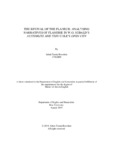| dc.contributor.advisor | Azim, Firdous | |
| dc.contributor.author | Rowshon, Sabah Tasnia | |
| dc.date.accessioned | 2019-09-19T06:08:41Z | |
| dc.date.available | 2019-09-19T06:08:41Z | |
| dc.date.copyright | 2019 | |
| dc.date.issued | 2019-08 | |
| dc.identifier.other | ID 17363009 | |
| dc.identifier.uri | http://hdl.handle.net/10361/12716 | |
| dc.description | This thesis is submitted in partial fulfillment of the requirements for the degree of Master of Arts in English, 2019. | en_US |
| dc.description | Cataloged from PDF version of thesis | |
| dc.description | Includes bibliographical references (pages 60-62). | |
| dc.description.abstract | The concept of the urban explorer, the flâneur, is a nineteenth century phenomenon which has
gone through major transformations in the last hundred years. Significantly, the flâneur is
being revived and refashioned in many contemporary literatures with a view to explore the
diverse elements of modern urban cosmopolitan space. My thesis explores the evolution of
the concept of this urban explorer by unpacking the figure of the flâneur in Western literature,
and illustrates how this modernist method is expounded by Charles Baudelaire, and later, by
Walter Benjamin. The re-occurrence of flânerie in contemporary texts is critically explored in
W. G. Sebald‟s Austerlitz and Teju Cole‟s Open City, the primary texts of my thesis. While
critics have already established the relation between the flâneur and urban alienation as a
modernist trope, the critical association between flânerie and issues of exile, dislocation and
migration (voluntary or force) is yet to be established. Therefore, this dissertation aims to
critically investigate the re-emergence of the flâneur in these primary texts through the lenses
of exile and dislocation, and furthers the discussion by focusing on the representation of
marginal spaces and marginalized subjects in the modern (cosmopolitan) nation-space; and,
finally, through a critical reading of postcolonial theory it investigates the new wanderers‟
view of the peripheral spaces, histories and voices of modern nation. | en_US |
| dc.description.statementofresponsibility | Sabah Tasnia Rowshon | |
| dc.format.extent | 62 pages | |
| dc.language.iso | en | en_US |
| dc.publisher | Brac University | en_US |
| dc.rights | Brac University theses are protected by copyright. They may be viewed from this source for any purpose, but reproduction or distribution in any format is prohibited without written permission. | |
| dc.subject | Exile | en_US |
| dc.subject | Flâneur | en_US |
| dc.subject | Marginality | en_US |
| dc.subject | Historical consciousness | en_US |
| dc.subject | Holocaust | en_US |
| dc.subject | Cosmopolitanism | en_US |
| dc.subject | Metropolis | en_US |
| dc.subject | Postcolonial identity | en_US |
| dc.subject.lcsh | Race--Fiction. | |
| dc.title | The revival of the Flâneur : analysing narratives of Flânerie in W. G. Sebald‟s Austerlitz and Teju Cole‟s Open City. | en_US |
| dc.type | Thesis | en_US |
| dc.contributor.department | Department of English and Humanities, Brac University | |
| dc.description.degree | M.A. in English | |

